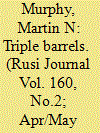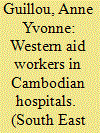| Srl | Item |
| 1 |
ID:
137941


|
|
|
|
|
| Summary/Abstract |
With the economic rise of powers such as China that wish to reinterpret the global order underpinning trade and international law, there is renewed requirement for Western navies to think about how maritime power can contribute to the protection of commerce in the twenty-first century. In this article, Martin N Murphy explores the intersection that is now evident between economic, financial and maritime warfare, assessing how maritime power can once again be used in the exploitation of economic and financial weakness.
|
|
|
|
|
|
|
|
|
|
|
|
|
|
|
|
| 2 |
ID:
128883


|
|
|
|
|
| Publication |
2013.
|
| Summary/Abstract |
Since the Khmer Rouge genocide (1975-79), Cambodia has been constructed as a victim par excellence, which exists only through Western financial aid and compassion. In this ideological context, non-governmental organizations (NGOs) mushroomed by the hundreds in the 1980s in the refugee camps along the Cambodia-Thailand border. They then flowed into Cambodia during the repatriation process under UNHCR supervision in the early 1990s. Because of the financial weakness of the Cambodian government at that time (when support from the USSR and other socialist countries abruptly ceased), the NGOs gained a powerful position as institutional partners of the government. Taking the example of the medical sector, this article analyses humanitarian ideology and its implementation in Cambodian hospitals in the 1990s. The author explores the contradiction between the Westerners' 'philosophy of development' versus the Cambodians' 'ethic of gift', based on an ethnographical account of the daily activities in Cambodian hospitals, from an interactionist perspective. The author observes the interactions between the Cambodian staff, the humanitarian NGO staff, the patients and their families, showing how the divergence of moral values, the historical construction of the medical profession and social games create conflict between the humanitarians and the Cambodians. This has a direct impact on the patient-physician relationship. Finally, while millions of dollars and thousands of hours of humanitarian work have been spent in Cambodia, some major public health indices have not been greatly improved.
|
|
|
|
|
|
|
|
|
|
|
|
|
|
|
|